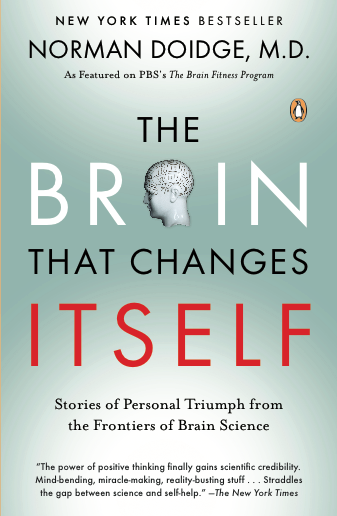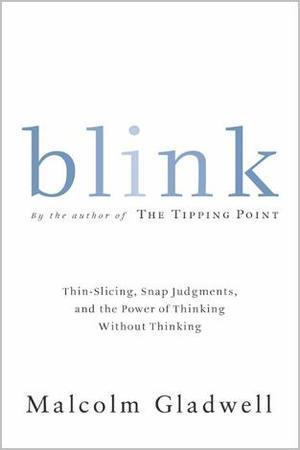I'm always looking for books to read to learn more about an upcoming Forum topic and to help inform our thinking as we develop a discussion outline to guide the Forum moderator.
When we were planning for the upcoming Science of Our Minds Forum, I spoke to Chris Knopf, who is on our Advisory Board and the CEO at Mintz + Hoke, about books about neuroscience and the brain that he would recommend. He shared so many good titles that I thought I'd add a few of my own and share them with you all. I hope you are able to check out some of these books before March 5!
- Jamie, Director of Programming
The Brain That Changes Itself by Norman Doige 
Chris says, "This is probably the best single layman’s resource on the subject. I’d definitely read this."
Book description: THE BRAIN CAN CHANGE ITSELF. It is a plastic, living organ that can actually change its own structure and function, even into old age. Arguably the most important breakthrough in neuroscience since scientists first sketched out the brain’s basic anatomy, this revolutionary discovery, called neuroplasticity, promises to overthrow the centuries-old notion that the brain is fixed and unchanging. The brain is not, as was thought, like a machine, or “hardwired” like a computer. Neuroplasticity not only gives hope to those with mental limitations, or what was thought to be incurable brain damage, but expands our understanding of the healthy brain and the resilience of human nature.
Mindset: The New Psychology of Success by Carol Dweck 
I read this book last year and have thought about it often since - the key concepts are so applicable to education, the workplace, raising children, relationships.. The book illustrates that the simple shift of believing that intelligence and personality can be developed, rather than believing that they are immutable traits, can have overwhelmingly positive results. Definitely recommend.
Book description from a great "Brain Pickings" review: One of the most basic beliefs we carry about ourselves, Dweck found in her research, has to do with how we view and inhabit what we consider to be our personality. A “fixed mindset” assumes that our character, intelligence, and creative ability are static givens which we can’t change in any meaningful way, and success is the affirmation of that inherent intelligence, an assessment of how those givens measure up against an equally fixed standard; striving for success and avoiding failure at all costs become a way of maintaining the sense of being smart or skilled. A “growth mindset,” on the other hand, thrives on challenge and sees failure not as evidence of unintelligence but as a heartening springboard for growth and for stretching our existing abilities. Out of these two mindsets, which we manifest from a very early age, springs a great deal of our behavior, our relationship with success and failure in both professional and personal contexts, and ultimately our capacity for happiness.
Blink by Malcom Gladwell 
Book description: Blink is a book about how we think without thinking, about choices that seem to be made in an instant-in the blink of an eye-that actually aren’t as simple as they seem. Why are some people brilliant decision makers, while others are consistently inept? Why do some people follow their instincts and win, while others end up stumbling into error? How do our brains really work-in the office, in the classroom, in the kitchen, and in the bedroom? And why are the best decisions often those that are impossible to explain to others?
Quiet: The Power of Introverts by Susan Cain 
I recommend this one if you are a teacher, a parent, a colleague, a partner, a boss, or anyone who is or interacts with introverts on a regular basis. It made me think differently about what traits our society values and what we are losing by not finding ways for introverts to thrive and lead.
Book description: In Quiet, Susan Cain argues that we dramatically undervalue introverts and shows how much we lose in doing so. She charts the rise of the Extrovert Ideal throughout the twentieth century and explores how deeply it has come to permeate our culture. She also introduces us to successful introverts—from a witty, high-octane public speaker who recharges in solitude after his talks, to a record-breaking salesman who quietly taps into the power of questions. Passionately argued, superbly researched, and filled with indelible stories of real people, Quiet has the power to permanently change how we see introverts and, equally important, how they see themselves.
This Is Your Brain on Music by Daniel Levitin 
Book description: Levitin interrogates the basic nature of hearing and of music making without losing an affectionate appreciation for the songs he's reducing to neural impulses. Levitin is the ideal guide to this material: he enjoyed a successful career as a rock musician and studio producer before turning to cognitive neuroscience, earning a Ph.D. and becoming a top researcher into how our brains interpret music. Though the book starts off a little dryly (the first chapter is a crash course in music theory), Levitin's snappy prose and relaxed style quickly win one over and will leave readers thinking about the contents of their iPods in an entirely new way.
The Sociopath Next Door by Martha Stout 
Chris called this one "spooky and informative. You’ll never again look at your friends, neighbors and relatives quite the same way."
Book description: We are accustomed to think of sociopaths as violent criminals, but in The Sociopath Next Door, Harvard psychologist Martha Stout reveals that a shocking 4 percent of ordinary people—one in twenty-five—has an often undetected mental disorder, the chief symptom of which is that that person possesses no conscience. He or she has no ability whatsoever to feel shame, guilt, or remorse. One in twenty-five everyday Americans, therefore, is secretly a sociopath. They could be your colleague, your neighbor, even family. And they can do literally anything at all and feel absolutely no guilt... Part of the urgency in reading The Sociopath Next Door is the moment when we suddenly recognize that someone we know—someone we worked for, or were involved with, or voted for—is a sociopath. But what do we do with that knowledge? To arm us against the sociopath, Dr. Stout teaches us to question authority, suspect flattery, and beware the pity play. Above all, she writes, when a sociopath is beckoning, do not join the game.
On Being Certain by Robert A. Burton 
Book description: In On Being Certain, neurologist Robert Burton shows that feeling certain―feeling that we know something--- is a mental sensation, rather than evidence of fact. An increasing body of evidence suggests that feelings such as certainty stem from primitive areas of the brain and are independent of active, conscious reflection and reasoning. In other words, the feeling of knowing happens to us; we cannot make it happen.Bringing together cutting-edge neuroscience, experimental data, and fascinating anecdotes, Robert Burton explores the inconsistent and sometimes paradoxical relationship between our thoughts and what we actually know. Provocative and groundbreaking, On Being Certain challenges what we know (or think we know) about the mind, knowledge, and reason.
Emotional Intelligence by Daniel Goleman 
Chris says, "if you haven’t read it, worth a look even though it was written before the big explosion in fMRI research. Still fundamentally sound.
Book description: Everyone knows that high IQ is no guarantee of success, happiness, or virtue, but until Emotional Intelligence, we could only guess why. Daniel Goleman's brilliant report from the frontiers of psychology and neuroscience offers startling new insight into our "two minds"—the rational and the emotional—and how they together shape our destiny. Through vivid examples, Goleman delineates the five crucial skills of emotional intelligence, and shows how they determine our success in relationships, work, and even our physical well-being. What emerges is an entirely new way to talk about being smart.






 View All Sponsors ›
View All Sponsors ›
